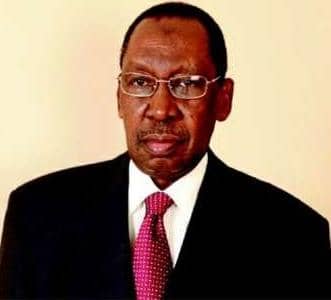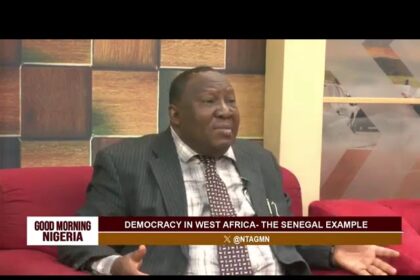When he opened the All Nigerian Judges Conference in February 2003, then Chief Justice of Nigeria (CJN), Mohammed Lawal Uwais, who died on 6 June 2025, six days short of his 89th birthday, lamented the fact that State Chief Judges in Nigeria “go begging for funds from their governors”; a practice pioneered by the military. It was part of a wider complaint about the historical legacies of judicial corrosion inherited from military rule. It also reflected the values of a man for whom judicial integrity was a way of life, and an independent judiciary was a constitutional mandate of the highest salience.
In 1976, Mohammed Lawal Uwais secured a loan from the Nigerian Building Society to enable him to build a modest home in Kaduna for his mother, Hajiya Hajara. At that point, Uwais had worked as a judge of the High Court for over four years, including a stint as Acting Chief Justice of the North Central (later Kaduna) State. Yet he had only one bank account with Union Bank.
Nearly thirty years later, entering his tenth year as Chief Justice of Nigeria, Uwais’ office as CJN suffered what looked like a mysterious burglary. The Chambers of the Chief Justice is supposed to be a sanctuary inside the Supreme Court of Nigeria where the CJN presides over the judicial shrine. It ought to be one of the most protected spaces in the country. The idea of a burglary in that office is so ordinarily implausible as to make the provenance of such an act easily predictable.
The burglary coincided rather conveniently with a period of intense judicialization of the political antipathy between then vice-president, Atiku Abubakar, and his principal, Olusegun Obasanjo, over the latter’s attempt to succeed himself by lifting constitutional term limits that he had sworn to preserve and protect. That political conflict spawned a succession of high-profile cases which ended up at the Supreme Court, resulting in decisions that constrained the caprice of the president. Entirely characteristic of CJN Uwais, the court in case after case, handed President Obasanjo a judicial shellacking with neither flash nor flourish.
It later turned out that the convenient burglar appeared to have been desperate to find non-existent material to dent the record of an uncompromising CJN and probably afflict him with indelible ignominy. Instead, all they could find were records indicating that the man had maintained the same bank account for over four decades and with impeccable integrity.
Few would have predicted this turn of events in the relationship between Uwais and the man who preferred him to the Supreme Court as a sprightly 43-year-old in August 1979. On 11 August 1979, the country had voted in a contentious presidential ballot in preparation for the return to civil rule after 13 years and nine months of bloody military rule. Five days later, on 16 August, the Federal Electoral Commission (FEDECO) announced Shehu Shagari of the National Party of Nigeria (NPN) the winner.
On 15 August, army general and departing military ruler Olusegun Obasanjo appointed two new Supreme Court justices. One was a Pharmacist-turned-lawyer and Attorney-General of the Federation, Augustine Nnamani. The other was Mohammed Uwais, something of a judicial prodigy. The following week, Obasanjo also appointed a new CJN, Atanda Fatayi Williams, to oversee the adjudication of the dispute over the 1979 election.
As Attorney-General of the Federation, Nnamani had authored the Electoral Act at the centre of the presidential election dispute. That precluded him from sitting on the dispute and catapulted Uwais onto the bench that would ultimately decide the destination of the presidency in 1979.
For Uwais, this guaranteed that his Supreme Court career would begin at the very deep end. It was a new high in a career that was destined for the very top. He had the good fortune of being born in Zaria, home to some of the most elite schools in the country.
The son of a railway worker from Zaria, Abdullahi Uwaisu and his wife, Hajara, Mohammed Lawal Uwais was bereaved of his biological father at the age of six in December 1942. When his mother remarried two years later to a headteacher, Mohammed Jumare, Mohammed Uwais acquired a stepfather who inspired his educational pursuits under the watchful eyes of a doting mother. His high school education was at the elite Barewa College, where he was junior to Yakubu Gowon and in the same class and good friends with Gowon’s nemesis, Murtala Mohammed.
A graduate of the Institute of Administration at Ahmadu Bello University in Zaria, Uwais did his vocational legal training at the Inns of Court in London before becoming part of the pioneer set of lawyers graduated by the Nigerian Law School in 1963.
After his admission to the Nigerian Bar, Uwais returned to his civil service career, this time in the Ministry of Justice, first in the Northern Region, and then in the North Central (later Kaduna) State. Mohammed Bello, the Director of Public Prosecutions (DPP) under whom he worked as State Counsel, became his colleague at the Supreme Court and immediate predecessor in the office of CJN. In the Ministry of Justice of the North Central State, Uwais became Solicitor General and Permanent Secretary in 1971.
The following year, under the government of his high school senior, Yakubu Gowon, Uwais was appointed Acting Judge of the High Court of the North Eastern State. He was only 36.
In 1975, when his high school mate, Murtala Mohammed, emerged as military ruler after overthrowing Gowon, Uwais was offered the office of Chief Justice of the North Central State but turned it down in favour of a more senior serving expatriate judge, A.W.E. Wheeler. When the military established the Court of Appeal the following year, Wheeler preferred him from Kaduna State to the bench of the new court at 40. When Uwais got to the Supreme Court three years later, he was only 43. He went on to serve as Justice of the Supreme Court for 27 years, setting a record of apex court durability that is unlikely to be threatened.
When Nigeria returned to civil rule in 1999 after another 15 unbroken years of military rule, Uwais had already been in office as the eighth indigenous CJN for four years. He was well-placed to stabilize the judiciary through the teething years of institutional adaptation.
Uwais spent 11 of his 27 Supreme Court years as CJN, making him the second longest in that office after Adetokunbo Ademola, the first indigenous Chief Justice, who logged a record 14 years in that office until 1972. Uwais instituted and oversaw rigorous standards of judicial discipline and performance. A mere four years into civil rule, by the beginning of 2004, over 20 judicial officers had been relieved of their positions for judicial malfeasance. Under him, the Nigerian judiciary was voted “Man of the Year” in 2005.
Two years after his retirement as CJN, Uwais came out of retirement to head a blue-ribbon panel on electoral reform in Nigeria. His characteristically thoughtful report continues to suffer neglect to the detriment of democratic sustainability in the country.
Uwais was quietly uncompromising on judicial integrity. In a profound set of interviews with Princeton University in 2009, CJN Uwais underscored the need to eliminate bribery, corruption, nepotism and political interference within the judicial systems. A committed institutionalist with a peerless recall on the evolution of Nigeria’s judiciary, Uwais declined to write any memoirs.
The father of a very senior lawyer and husband to a wife both capable and experienced as a lawyer, Uwais did not nominate any members of his family to the bench. Many of his successors in the office of CJN, who served for less than a fraction of his tenure, were compulsive nepotists in favour of family members with less than marginal qualification or ability.
Current CJN, Kudirat Kekere-Ekun, paid tribute at his death to the capacity of Mohammed Uwais to “lead without pretence, and to mentor without fanfare.” Uwais made his earthly exit on Friday, 6 June 2025, entirely in keeping with how he lived his life – without fanfare.
A lawyer and a teacher, Odinkalu can be reached at chidi.odinkalu@tufts.edu
![]()








